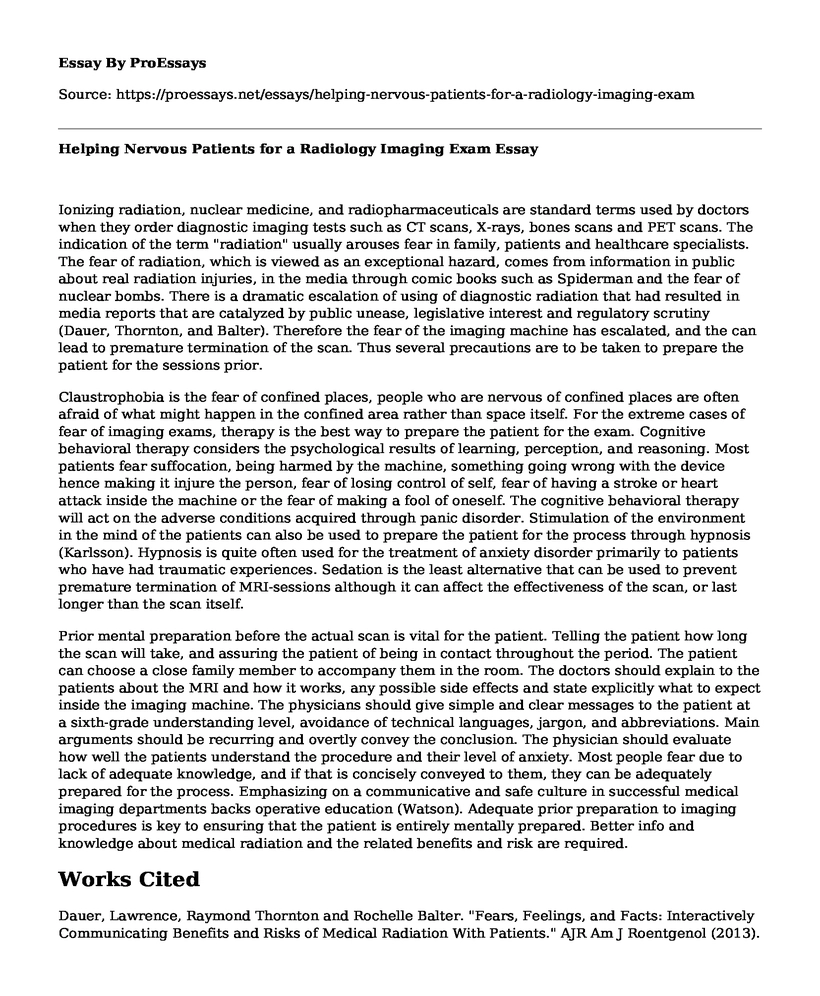Ionizing radiation, nuclear medicine, and radiopharmaceuticals are standard terms used by doctors when they order diagnostic imaging tests such as CT scans, X-rays, bones scans and PET scans. The indication of the term "radiation" usually arouses fear in family, patients and healthcare specialists. The fear of radiation, which is viewed as an exceptional hazard, comes from information in public about real radiation injuries, in the media through comic books such as Spiderman and the fear of nuclear bombs. There is a dramatic escalation of using of diagnostic radiation that had resulted in media reports that are catalyzed by public unease, legislative interest and regulatory scrutiny (Dauer, Thornton, and Balter). Therefore the fear of the imaging machine has escalated, and the can lead to premature termination of the scan. Thus several precautions are to be taken to prepare the patient for the sessions prior.
Claustrophobia is the fear of confined places, people who are nervous of confined places are often afraid of what might happen in the confined area rather than space itself. For the extreme cases of fear of imaging exams, therapy is the best way to prepare the patient for the exam. Cognitive behavioral therapy considers the psychological results of learning, perception, and reasoning. Most patients fear suffocation, being harmed by the machine, something going wrong with the device hence making it injure the person, fear of losing control of self, fear of having a stroke or heart attack inside the machine or the fear of making a fool of oneself. The cognitive behavioral therapy will act on the adverse conditions acquired through panic disorder. Stimulation of the environment in the mind of the patients can also be used to prepare the patient for the process through hypnosis (Karlsson). Hypnosis is quite often used for the treatment of anxiety disorder primarily to patients who have had traumatic experiences. Sedation is the least alternative that can be used to prevent premature termination of MRI-sessions although it can affect the effectiveness of the scan, or last longer than the scan itself.
Prior mental preparation before the actual scan is vital for the patient. Telling the patient how long the scan will take, and assuring the patient of being in contact throughout the period. The patient can choose a close family member to accompany them in the room. The doctors should explain to the patients about the MRI and how it works, any possible side effects and state explicitly what to expect inside the imaging machine. The physicians should give simple and clear messages to the patient at a sixth-grade understanding level, avoidance of technical languages, jargon, and abbreviations. Main arguments should be recurring and overtly convey the conclusion. The physician should evaluate how well the patients understand the procedure and their level of anxiety. Most people fear due to lack of adequate knowledge, and if that is concisely conveyed to them, they can be adequately prepared for the process. Emphasizing on a communicative and safe culture in successful medical imaging departments backs operative education (Watson). Adequate prior preparation to imaging procedures is key to ensuring that the patient is entirely mentally prepared. Better info and knowledge about medical radiation and the related benefits and risk are required.
Works Cited
Dauer, Lawrence, Raymond Thornton and Rochelle Balter. "Fears, Feelings, and Facts: Interactively Communicating Benefits and Risks of Medical Radiation With Patients." AJR Am J Roentgenol (2013).
Karlsson, Mikael. "The Problem of Claustrophobia with Proposed Solutions." Bachelor Degree Project in Cognitive Neuroscience (2012): 5-35.
Watson, Liana. "Patient Safety and Quality in Medical Imaging: The Radiologic Technologist's Role." The ASRT Foundation Health Care Industry Advisory Council Subcommittee on Patient Safety and Quality in Medical Imaging (n.d.): 1-10.
Cite this page
Helping Nervous Patients for a Radiology Imaging Exam. (2022, May 09). Retrieved from https://proessays.net/essays/helping-nervous-patients-for-a-radiology-imaging-exam
If you are the original author of this essay and no longer wish to have it published on the ProEssays website, please click below to request its removal:
- Iron Deficiency Anemia and Folate Deficiency Anemia Essay
- Research Paper on Growth & Development: How Childhood Nutrition Shapes Life as an Adult
- Educating Medical MD Employer Group on Diabetic Management - Essay Sample
- Smoking Cessation: Impact of 5A's Tool Counseling Intervention - Research Paper
- Radiographers & Operators: Applying 3 Principles to Ensure Safety - Essay Sample
- Essay Example on Abortion Debate: Pro-Choice and Pro-Life Views in 2021
- Paper Sample on Effective Health Histories: Communication & Interview Techniques







